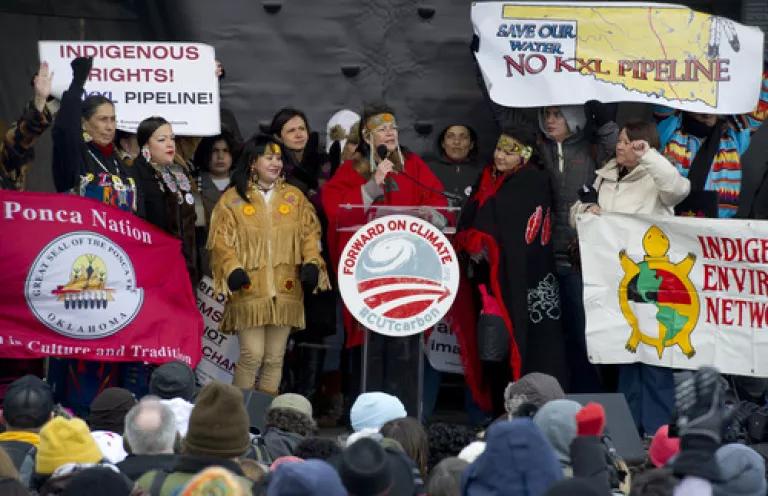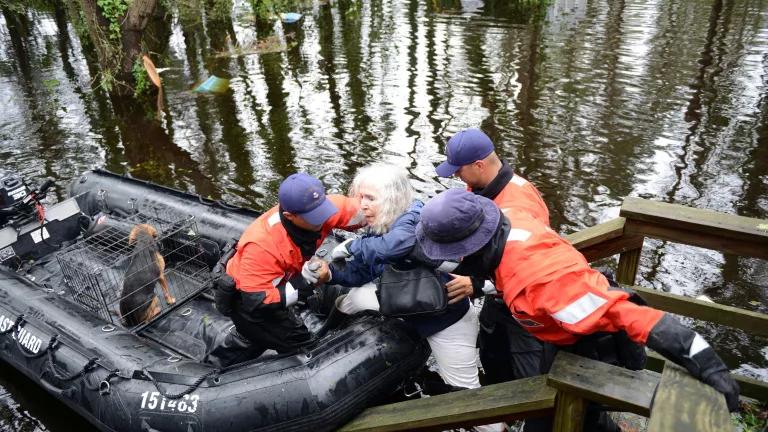
On February 17, more than 35,000 braved the icy temperatures to take a message of hope for our climate to the President’s doorstep. Marching in a human pipeline around the White House, people from across America and Canada also showed what real solidarity and neighborliness looks like.
Good neighbors don’t push dirty energy projects such as the Keystone XL tar sands pipeline that hurt communities, water and climate. Good neighbors and allies work together to bring leadership to tackle climate change and build a clean energy future. Good neighbors build solidarity around a common vision of the world we want for ourselves and our children: one without the threats of ever worsening climate change causing droughts, wildfires, floods and violent storms. That solidarity exists with the people of Canada and yet is overshadowed in the press by the latest attempt to push the Keystone XL tar sands pipeline.
The Keystone XL tar sands pipeline is not in our national interest for many reasons and should not be built. This is something that both Canadians and Americans are saying. At the rally today, Crystal Lameman from the Beaver Lake Cree Nation in Alberta put it very well: “We can’t eat money and we can’t drink oil.” And Chief Jacqueline Thomas of the Yinka Dene Alliance in British Columbia said, “We have faith that people will do the right thing to protect Mother Earth.”
Over time, the oil industry has found many ways to push the Keystone XL tar sands pipeline. We have seen wildly exaggerated jobs numbers that falsely raised hope in areas that need work. We have seen arguments about energy security which were unbelievable considering this is a pipeline meant mostly for export. We have seen claims that if the US didn’t take the tar sands it would go to Asia even though Canadians were saying “no” to pipelines to their west coast. And the latest? Today, a New York Times article focused on the foreign relations dynamic of the Keystone XL tar sands pipeline decision. Posing the decision on this dirty energy project as something that is a choice between the environmental community and Canada is a false way of looking at it. Several points are worth considering:
- Canada and the United States have been friends and allies for a long time and will continue to be friends and allies long into the future. A single project that is in the interest of the oil industry, but not of Americans or Canadians, will not damage that relationship.
- Canada is already our largest supplier of oil. And Canada is our number one trade partner. A rejection of the Keystone XL tar sands pipeline will not erase the massive trade connections that we already enjoy.
- The current Canadian federal government unapologetically speaks for the tar sands oil industry. Prime Minister Stephen Harper is from Alberta and has moved Canada and the province of Alberta away from earlier Canadian goals of fighting climate change to developing the economy based on oil.
- Many provinces in Canada are concerned about expansion of tar sands and are working hard to diversify their energy sources with clean energy, as well as with energy efficiency and conservation.
- The general public in Canada is very concerned about climate change and many people and First Nations in British Columbia, Alberta, Ontario and Quebec who have experienced tar sands extraction, refining and the threat of tar sands pipelines are raising concerns in the same way that we in the United States are.
A rejection of the tar sands pipelines and of tar sands expansion is in the best interest of both Americans and Canadians. It will show tremendous leadership on the part of both of our countries to move together to tackle the climate change challenge by rejecting dirty fuels and moving forward with clean energy.
So let me come back to the wise words of Chief Jacqueline Thomas, immediate past Chief of the Saik’uz First Nation in British Columbia and co-founder Yinka Dene Alliance (“People of the Earth”): The Yinka Dene Alliance of British Columbia is seeing the harm from climate change to our peoples and our waters. We see the threat of taking tar sands out of the Earth and bringing it through our territories and over our rivers. The harm being done to people in the tar sands region can no longer be Canada’s dirty secret. We don’t have the billions of dollars that industry has. But we do have our faith that people will do the right thing to protect Mother Earth. The Forward on Climate Rally shows that we are not alone in the fight to stop tar sands expansion and tackle climate change.

Chief Jacqueline Thomas, Saik'uz First Nation, British Columbia




